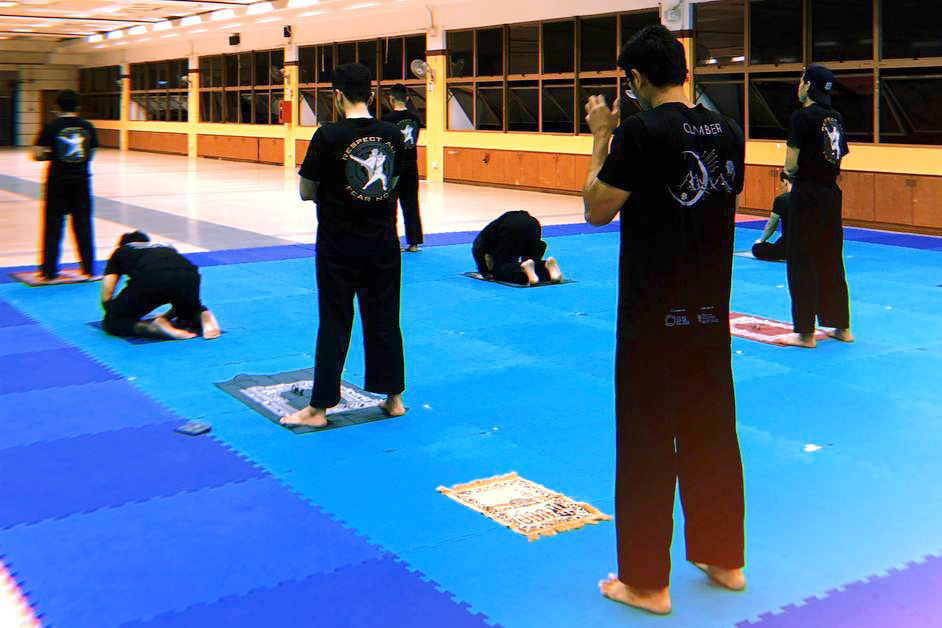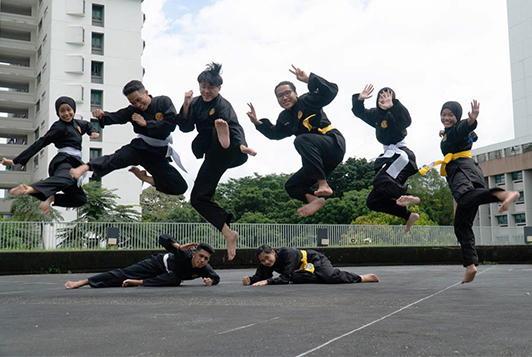Ramadan is a time when the Muslim community engages in spiritual reflections. April 13 marked the first day of Ramadan for Muslims and the month-long fasting will end on the evening of 12 May 2021. This will then be followed by Hari Raya Puasa the next day. OSA caught up with Muhammad Izzuddin Bin Mawar, Year 1 FASS student, an Executive Committee (Exco) member of NUS Silat who shared how he and his members struck a fine balance with the ever-accumulating exam stress, Co-Curricular Activities (CCAs) commitments while focussing on their faith during the 30-day fasting period.
OSA: Tell us more about NUS Silat
Muhammad Izzuddin Bin Mawar (Izzu): Silat is a martial art that originated in the Malay Archipelago. It involves the mental spirit and includes components that cross-cuts across the disciplines of art and culture, self defense and sport*. At NUS Silat, we train competitively in the NUS Varsity Team. Fasting helps us to get closer to our God, the act allows us to learn patience and to break bad habits.
The significance of the month of Ramadan for NUS Silat members, who are predominantly Muslim students pushes the team, to reconsider their approach to trainings. While increased fatigue, hunger and thirst due to fasting may not allow us to reach intensity levels such as before Ramadan, the more demanding conditions can be used as a motivation to push through and complete our martial arts training without breaking our fast.
*Source: National Heritage Board
OSA: What was the Ramadan experience like for NUS Silat members amid exams and COVID-19?
Izzu: Usually the team would plan several Iftars (sessions to break the fast) and perform our Terawih prayers as a team. In this new normal, these actions are not possible, but it doesn’t stop us from celebrating the holy month.
To accommodate our dedication to Terawih prayers during Ramadan, training times are moved earlier, so that those who wish to break their fast with their families are allowed to do so. However, this doesn’t reduce the intensity of the training. Ramadan and COVID-19 are not barriers preventing us from training, instead they provide opportunities for us to find alternatives to train and this shows in our abilities and stamina.
Editor’s Note: At the point of interview, students were on a training break to focus on their exams.

OSA: How does taking a break from training help?
Izzu: Just like how it takes time to internalise the teachings from the Quran, I’d like to give the example of a footballer who learns how to kick a ball. The player can kick a ball, but it doesn’t necessarily mean that he will score. A footballer needs a break to reflect, to practise and to internalise everything that he learned. Likewise for NUS Silat. Taking a break gives time for our bodies to recuperate and our muscles to develop. With this, we know that once we head back to the prayer mats, there would be a difference. We would be stronger, faster, and all-around a better martial artist compared to before the break from training due to exams.
OSA: What do you and your teammates look forward to when exams are done and training returns?
Izzue: We look forward to seeing our Silat family again after being separated for studies for almost two weeks. With the Tertiary Silat competition coming up in September 2021, we look forward to training so that we can push ourselves to the limits together, learning new kicks, punches, throws or takedowns.
| Want to learn more about NUS Silat? |
| NUS Silat is an open martial arts varsity team that accepts anyone who has an interest in the activity. Follow NUS Silat on Instagram @nus.silat or find out more on NUSync here. |
Share:
Contributor
Muhammad Izzuddin Bin Mawar, Year 1, FASS, NUS Silat Exco



